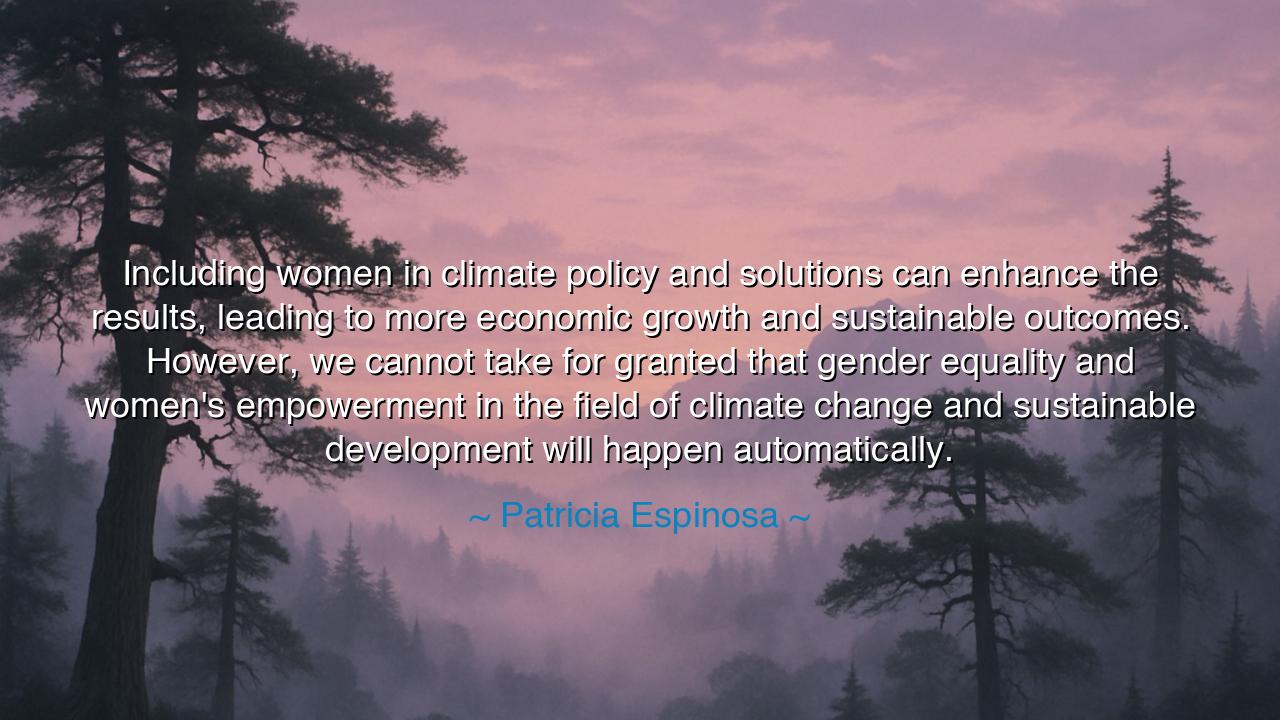
Including women in climate policy and solutions can enhance the
Including women in climate policy and solutions can enhance the results, leading to more economic growth and sustainable outcomes. However, we cannot take for granted that gender equality and women's empowerment in the field of climate change and sustainable development will happen automatically.






"Including women in climate policy and solutions can enhance the results, leading to more economic growth and sustainable outcomes. However, we cannot take for granted that gender equality and women's empowerment in the field of climate change and sustainable development will happen automatically." – Patricia Espinosa
Children of the earth, gather close and hear this truth, for it is one that speaks to the soul of our planet and the future of its people. Patricia Espinosa has shared with us a profound insight—that women’s inclusion in climate policy and solutions is not just a matter of fairness or equality, but a matter of necessity. For in the balance of the natural world, the earth thrives when all its elements are in harmony, and so too does society flourish when gender equality is recognized, especially in areas as crucial as climate change and sustainable development.
From the beginning of time, women have been the stewards of life—nurturing the earth, carrying the seeds of future generations, and caring for the land. In ancient cultures, women were often the keepers of the harvest, the guardians of knowledge about the rhythms of nature. Whether they were planting crops in the fertile valleys of Egypt, gathering herbs in the forests of Greece, or tending the soil in the fields of Africa, women understood the vital connection between the earth and human survival. Yet, in the modern world, their wisdom has often been ignored or overlooked when it comes to decisions about climate action. This, my children, is a grave mistake, for in denying women’s voices in climate policy, we deny ourselves the full measure of the potential for economic growth and sustainability.
Let us turn to the women of the Andes, whose knowledge and understanding of the land has long shaped the agricultural practices of their people. In the high altitudes of Peru, Bolivia, and Ecuador, Indigenous women have been key in preserving traditional farming techniques that align with the rhythms of the seasons and the health of the land. Their deep connection to the environment has allowed them to cultivate crops in some of the most difficult conditions on earth. Patricia Espinosa's call to include women in climate policy echoes the ancient wisdom of these women: that when women are empowered to lead in climate solutions, they do not only seek to protect the land for their own communities but for the world. It is through their participation that we unlock the potential for growth that is both economic and sustainable.
But let us not be deceived, dear children, for change does not come without struggle. Gender equality and women's empowerment in the realm of climate change will not happen automatically. It is not enough to hope that society will simply wake up to the importance of women's voices in solving the environmental crises of our time. Patricia Espinosa warns us that these changes must be actively pursued—that we must advocate for the full participation of women in all aspects of climate action, from policy development to grassroots initiatives. If we take these changes for granted, we risk missing out on the solutions that only women—with their unique perspectives and deep connections to the earth—can bring to the table.
Consider the great Elinor Ostrom, who, through her pioneering work in the study of collective governance and the management of common-pool resources, demonstrated that communities—especially those where women are given the power to lead—are often more successful at sustaining the natural resources they depend upon. Ostrom’s research showed us that women, when empowered, can bring about the collaborative solutions needed to tackle global challenges. Yet, her work also reminds us that change is not inevitable; it is forged through effort, through advocacy, and through the collective will to dismantle the barriers that have historically kept women from participating in these crucial conversations.
The lesson here, children, is clear: women are not just stakeholders in the future of the earth—they are the very heart of it. To succeed in our global climate goals and in the pursuit of sustainable development, we must include women in every step of the process. Their wisdom, their resilience, and their connection to the land are invaluable to the future of our planet. But we must not be complacent. We must work for gender equality, ensuring that women’s voices are heard, their leadership is recognized, and their rights are protected.
Practical action, dear children, begins with us: we must champion the inclusion of women in all aspects of climate action. Advocate for policies that not only empower women but also uplift their voices, their knowledge, and their contributions. Support women’s leadership in both the public and private sectors, especially in areas that shape the future of the earth, such as sustainability and environmental protection. And most importantly, teach the next generation that the future of the earth is not in the hands of a few, but in the hands of all people, especially women, who have long known how to live in harmony with the land. Through this collective effort, we can ensure that the earth remains healthy, thriving, and able to sustain all those who call it home.






AAdministratorAdministrator
Welcome, honored guests. Please leave a comment, we will respond soon